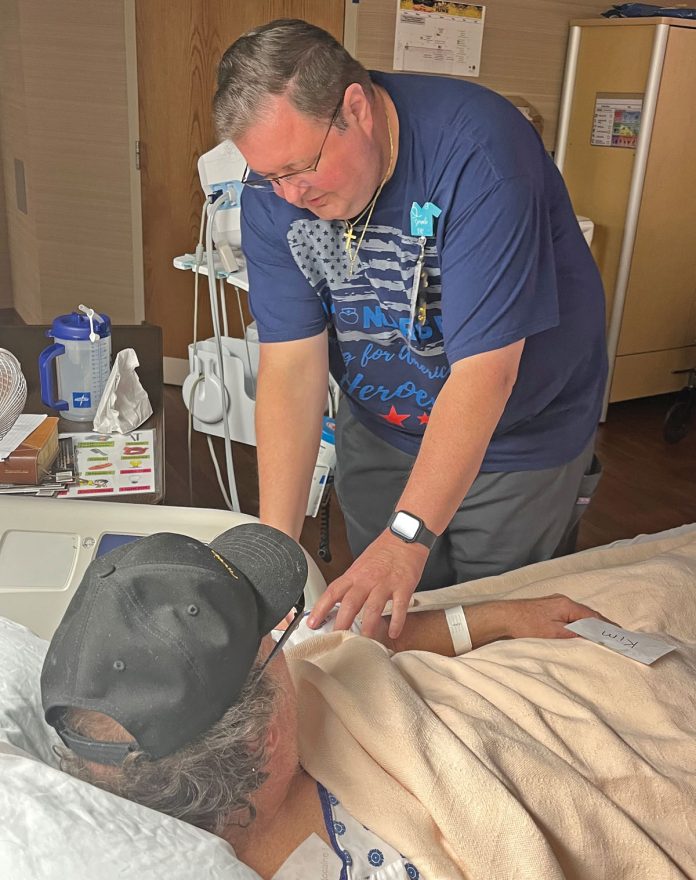
story by Vickie Jenkins, Staff Writer
Dustin Thomasson, R.N. previously worked in the private sector as an assistant nursing director and nursing director, before serving as Nurse Manager for the Community Living Center at the Oklahoma City VA Medical Center.
It is a place the Louisiana native is glad to call home.
“I came to the VA two-and-a-half years ago from the private sector,” said Thomasson, an Oklahoma City Community College graduate. “I’ve had a lot of friends that worked here and they told me about the different geriatric programs, the CLC (Community Living Center), and I knew that was something that really intrigued me and I wanted to be a part of that.”
Thomasson said working in the private sector wasn’t for him.
“I was tired of being very profit driven, more worried about profits than patient care,” he said. “I just got to the point where that was no longer enticing me and I wanted to go somewhere where I felt like there was a stronger drive towards doing the right thing for the patient, and that’s what I heard from several people, friends that I’ve had at the VA, and that was one of the big draws. It was not about money, it was more about being able to sleep at night, giving a good quality of care and knowing that I felt good about going home at night for the job that I did.”
A Community Living Center (CLC) is a VA Nursing Home. Veterans may stay for a short time or, in rare instances, for the rest of their life. It is a place where Veterans can receive nursing home level of care, which includes help with activities of daily living and skilled nursing and medical care.
There are over 100 Community Living Centers across the country.
Thomasson worked his way up the VA ladder to his current position including working in the VA’s Behavioral Health Department which offers both inpatient and outpatient services, including telehealth appointments.
They provide consultation, evaluation, and treatment for a variety of issues impacting emotional well-being. Services include:
• Psychiatry
• Psychology
• Homeless Veterans services
“Treatment for addictive disorders, including residential rehabilitation treatment programs
“Transition and care management for returning Veterans (OIF/OEF/OND)
“My entire background is mostly long-term care such as nursing home, DLNs, quality assurance, wound care,” he said. “I started out in the psych unit. I was about six months into it, when I walked into an assistant nurse manager role and then last year became the nurse manager for the community living center, which is the long-term care facility here at the VA.”
Thomasson said the CLC also has a palliative care unit.
Palliative Care uses comfort care with a focus on relieving suffering and controlling symptoms so that you can carry out day-to-day activities and continue to do what is most important to you. Palliative care aims to improve your quality of life – in your mind, body and spirit. Palliative Care can be combined with treatment that is aimed at curing or controlling your illness. It can be started at the time of your diagnosis and may be provided throughout the course of the illness.
“It’s a 31-bed unit,” Thomasson said. “Eight of those beds are flexed through our palliative care veterans who are seeking such as symptom management, pain management. It’s not always about the end of life.”
Thomasson said the Oklahoma City VA has worked hard to fill open positions to help give veterans the best service possible.
“I would say one of the things that we’re most proud of down there was we had a large gap in our staffing that we’ve closed,” he said. “We’ve had zero turnover in the last year with our staffing. Our last two annual surveys have been amazing. We will be one of the only CLCs once our (latest) survey posts to have five stars in all three areas of staffing quality. We have access to our leadership every morning through our communication. The communication here is second to none.”
Thomasson said those positive survey results are part of a team effort.
“That’s the staff out there on the floor,” he said. “It’s those nurses believing in what they do, taking care of those veterans. It’s watching those people grow a fellowship among themselves who want to work together as a team very cohesively to provide the best care possible and the best outcomes possible. It’s about doing the right thing for that veteran and that’s what we’re going to do.”












